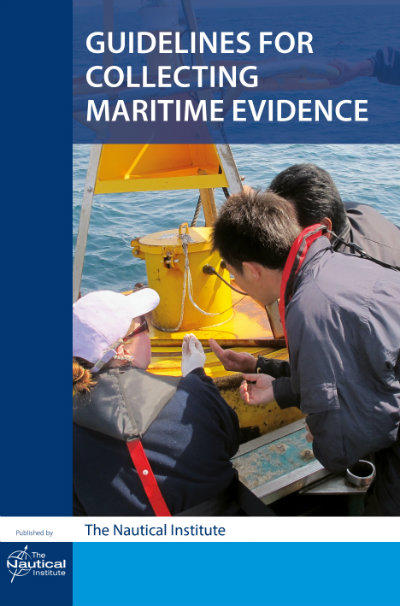The Nautical Institute launches Guidelines for Collecting Maritime Evidence
The book is a completely revised edition of The NI’s popular The Mariner’s Role in Collecting Evidence.
PRESS RELEASE
The Nautical Institute launches maritime evidence guidelines

18.05.17
It is rare for a book to sell out before publication, but demand for The Nautical Institute’s latest book, Guidelines for Collecting Maritime Evidence, has been so strong that it has had to be reprinted before its official launch today.
This practical guide is intended for everyone at sea and on shore – Master, crew and managers – who might need to handle material after a maritime incident that could be used as evidence for later legal proceedings, insurance claims etc. It is an essential tool that will remove much of the uncertainty from the task and will reduce the risk of seafarer criminalisation.
The book is a completely revised edition of NI’s popular The Mariner’s Role in Collecting Evidence. The scope has been broadened and the content updated to reflect the growing importance of electronic evidence. A state safety inspector, Master, insurer, surveyor, lawyer and an arbitrator each describe evidence collection from their own point of view, explaining what material needs to be gathered and how it will be used. The book is accompanied by a separate Handbook that should be kept on board as a quick reference guide.
As NI President Captain Duke Snider FNI said at the launch, “We all hope that we are not faced with a casualty, but I doubt if there is a shipping professional who has managed to go through their entire service without being involved in some form of accident.”
Duke added: “This book should be required reading for all officers.”
Guidelines for Collecting Maritime Evidence was launched at the Institute’s Command Seminar at Trinity House, London. The packed programme focused on the theme of Navigation Accidents and their Causes, with presentations covering a wide range of subjects from Mentoring, Navigation Assessments and Bridge Teamwork to Ice Navigators and New Mindsets.
The second day of the seminar was graced by the presence of Her Royal Highness The Princess Royal. In her keynote address, opening this morning’s session, The Princess Royal highlighted the importance of training and seafarer welfare. The Nautical Institute has a key role to play in both these areas, she said. “We are looking not just to learn from the examples of the past, but also to see how technology, knowledge and the skills base will be able to prevent those accidents in the future.”
One of key issues is how you get the information that is gathered to the next generation, she added. This is something that The Nautical Institute is tackling through its promotion of mentoring.
All the Command Seminars offer excellent opportunities for debate, discussion and networking with maritime professionals. The next event takes place in Cork, Ireland, on 12‑13 October, before concluding in Limassol, Cyprus, on 3 November.
More details about all these events can be found on our website at: www.nautinst.org/Command-2017.
To purchase your copy of Guidelines for Collecting Maritime Evidence (accompanied by The Mariner’s Role in Collecting Evidence – Handbook) visit http://www.nautinst.org/pubs; price: £45; ISBN: 978 1 906915 54 4.
Ends
For more information and review copies please contact Bridget Hogan, Director of Publishing and Marketing, The Nautical Institute +44 (0)20 7928 1351, [email protected]
Editor’s notes:
The Nautical Institute is an international representative body for maritime professionals involved in the control of seagoing ships. It provides a wide range of services to enhance the professional standing and knowledge of members, who are drawn from all sectors of the maritime world. Founded in 1972, it has over 40 branches worldwide and some 7,000 members in more than 120 countries.
Please note: The Nautical Institute takes a capital T on The
